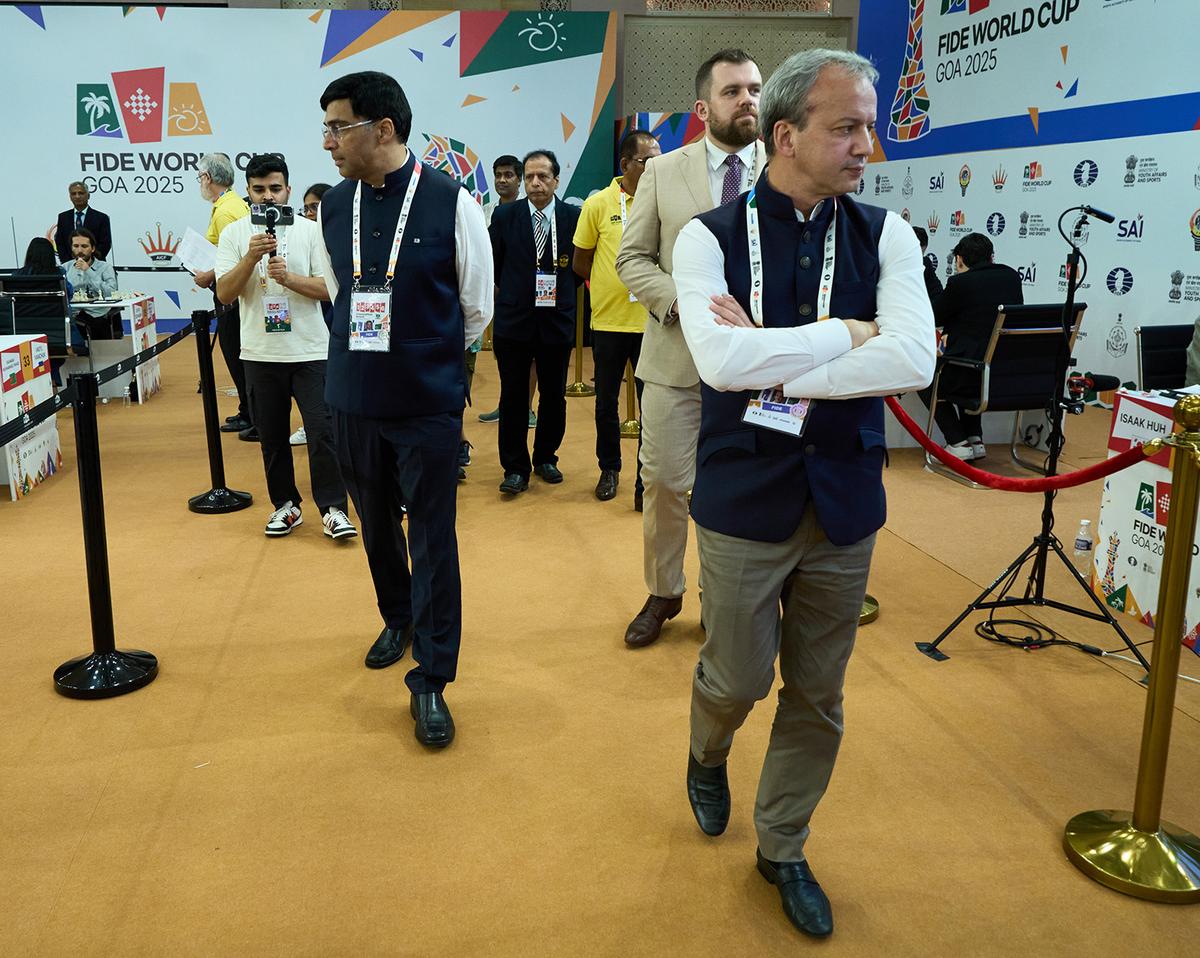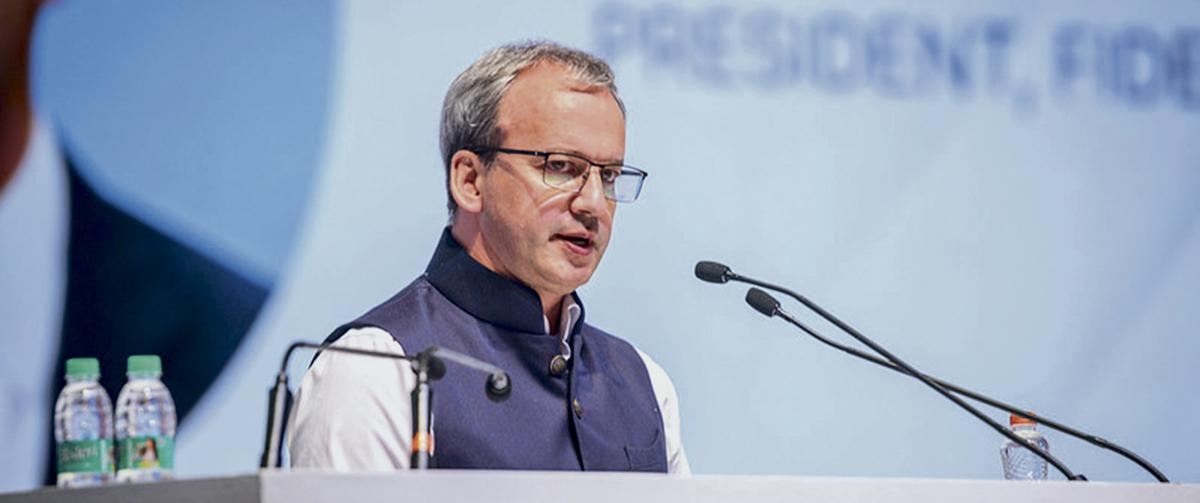India must have become quite familiar to Arkady Dvorkovich by now. Since the country hosts major chess events regularly, the FIDE president often flies to the land where the game originated all those centuries ago.
He made the ceremonial opening move of the World Cup at Resort Rio in North Goa over the weekend. Shortly before that, the head of the world chess governing body spoke at length about several topics, including the unfortunate death of Daniel Naroditsky (following which former World champion Vladimir Kramnik came under fire for his comments on cheating targeted against the American Grandmaster), the newly announced Total World chess championship and India’s emergence as a host for major FIDE events.
On the World Cup
This is going to be an exciting tournament. We, at FIDE, are thankful to the Indian and Goan governments as well as the All Indian Chess Federation (AICF) for creating all required conditions for hosting this event.
After the World Cup was given to India, it was up to the AICF to decide which city will play the host. The conditions for players, logistics, weather, hotel and local support were the deciding factors and the AICF proposed Goa. There are many beautiful places in India, and we have been hosting events all around and it is good to be in a new place. It was a little bit short notice, of course, as hotels are usually booked one year in advance.
On Daniel Naroditsky’s death
I personally and we all at FIDE are really sorry about the tragic death of Daniel. He was really a personality that influenced the chess world in a positive manner, by being a player, commentator and educator.
For me it is really personal, but it is also an institutional issue. We all understood that he was affected by the hints, sometimes aggressive hints, related to potential cheating. Even if those were not direct accusations, he felt like those were against him and some other players, like David Navara, for instance.

| Photo Credit:
FIDE
At the moment it is in the hands of FIDE’s Ethics Commission, so I cannot pre-empt the findings. We have passed on the evidence, which was provided to us, to the people who will investigate.
Having said that, I need to mention that I had tried to persuade Kramnik, informally, not to make those aggressive comments. Not after what happened, but a long time before that, as I felt that it was a bit too much. And also, I asked him to provide the full methodology that he was using for his allegations. We haven’t received it yet. We hope that at some point we will be provided with the whole methodology.
On cheating in chess
We have always taken it very seriously. The question is how the whole community feels about that, since we do need all the support to deal with the issue. Online component is the most difficult one, of course, and here the collaboration with the online platforms is essential.
They do have their own approaches. They share those partially, and not fully, and I understand that. We need to have deeper collaboration. We do not carry forward the sanctions (for online players) to over-the-board events. We don’t know for sure if somebody is banned, let us say, on chess.com and if there is 100% proof for that, we can ban the same player in over-the-board events, too. And to come to that point, we need full understanding.
We have much better equipment now (to deal with cheating). We can really find signals in the playing halls, if there are any. So, everyone should be aware that if there is a real signal, we will find it. Players, I think, are aware of that.
I am quite confident that here we have a truly fairplay environment and we have the best specialists possible. M.S. Gopakumar, who is one of the best arbiters and fairplay specialists, is responsible for this here in the playing hall of the World Cup.
We cannot now guarantee such a system in all rated tournaments around the world, which run into thousands, but at top-level events, we can really guarantee it.
On the new Total World chess championship
Well, first of all, we do believe that our classical World title is the most important one. And that is a chess tradition and history. And we do know from talking to people, from opinion polls, from viewership data, that still it is the most likeable title; and people believe that the best player in the world is the champion in that format. So, we do hope that it will remain the same.
But the reality is that life is faster, and even classical chess is getting faster. The time control for the World Cup, for instance, is shorter than that for the World championship match. Personally, I believe that this time control is better than the others. Also for spectators, for sponsors, faster controls are more likeable in terms of viewing, looking at chess events.

We believe that we should complement the pure classical time control with other things. We do have rapid and brief championships, of course. It came like a kind of coincidence that we were thinking about something like that (Total World championship) and Norway Chess came to us with this initiative. They said that we want to complement it with something new, not substitute and they are very good partners.
On India being a major host for big FIDE events
I think the real jump was when Chennai wanted to host the Olympics back in 2022. And that was really short notice for such a huge event. That is when we started building our really close ties with the AICF and the federal government and local governments. So, we are thankful to our Indian friends for organising a huge event like the Olympiad for which 180 teams arrived.
And then we started doing events every year. Women’s Grand Prix, youth events… We do believe that such a big country and chess powerhouse as India should be able to host at least one major event per year.
On the importance of D. Gukesh winning the World title at 18
Firstly, it was an amazing thing to see such a young player winning the World Championship. And, of course, it is very good for India.
But it is also very good for young players all around the world, since now they know that anything is possible. That they can really challenge top grandmasters and try to win. So, that is important.
But Gukesh should prove now that he is at this level. He is learning. He is trying to play in many events. He is playing the World Cup here. He doesn’t need to play or qualify from the Candidates (as he is the defending World champion), but he is coming here to show his strengths as well. I like that he is doing it.
Of course, we were happy to see a new generation of players coming to the stage and competing for the top positions.
Now, the next challenge is to make sure that India shows also an example how to raise the next generation, how to bring chess in schools in particular, to create the foundation for the future development of chess, not just having 20 top players, but also having hundreds of thousands of young players playing and maybe some of them will go to the top level.
So, that is the new stage of our collaboration. We have signed a memorandum with KIIT and the AICF to develop educational chess in the country and globally.

